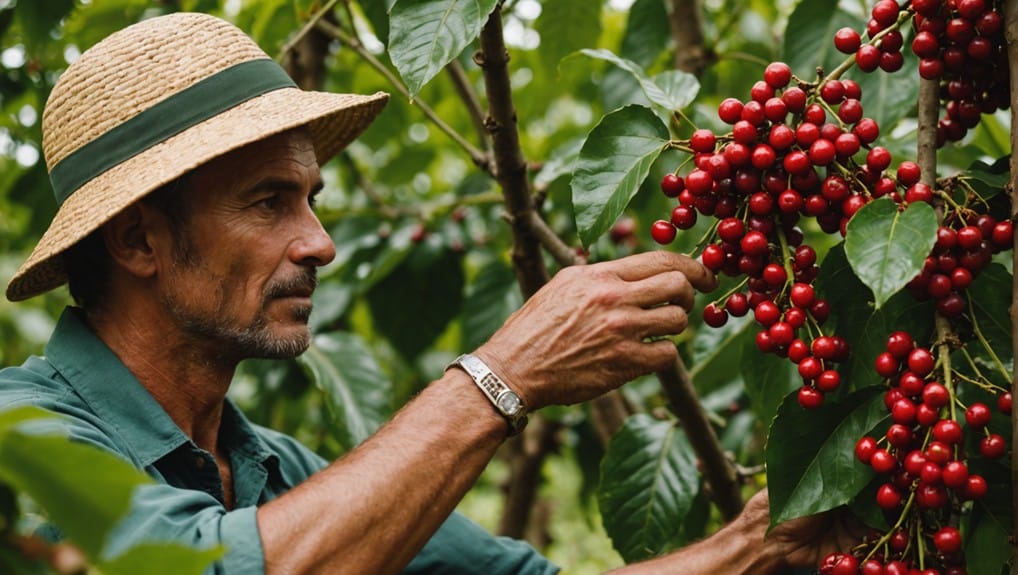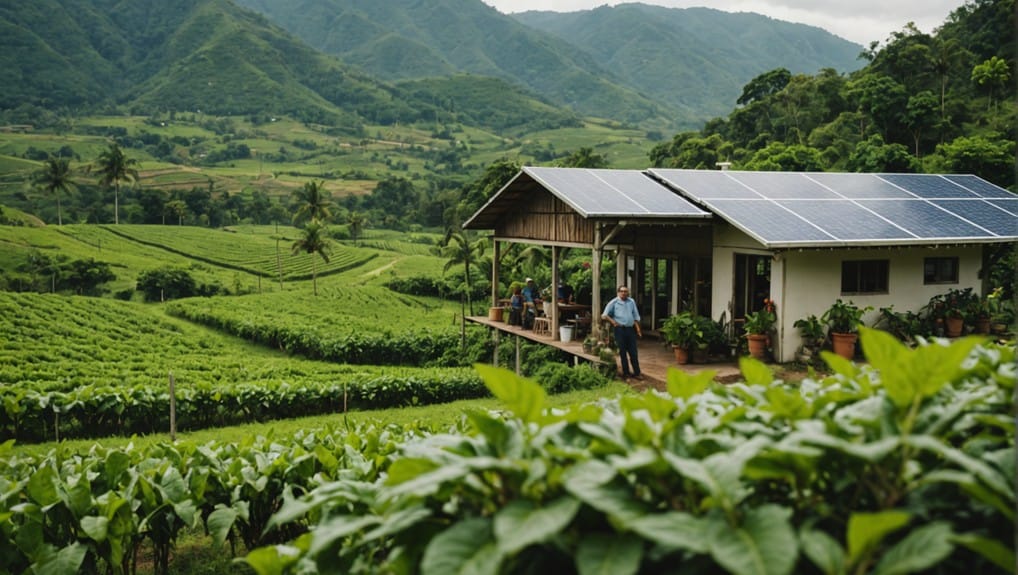Physical Address
304 North Cardinal St.
Dorchester Center, MA 02124
Physical Address
304 North Cardinal St.
Dorchester Center, MA 02124

In the rapidly evolving coffee terrain, direct trade is brewing up a transformation by linking producers directly to consumers. Eliminating intermediaries has made fair compensation, transparent sourcing, and a commitment to sustainability achievable, helping producers gain notably higher earning potential – up to five times more than traditional methods. Consequently, coffee quality has soared, and an environmentally friendly production process benefits everyone. What does this shift mean for the coffee industry’s future, and how can you make conscious purchasing decisions that benefit the entire supply chain – from plantation to cup.
In recent years, a paradigm shift in the coffee industry has given rise to direct trade, a groundbreaking model that is transforming the way coffee is sourced, traded, and consumed. This shift is largely driven by consumer awareness and changing market trends, as coffee enthusiasts increasingly seek high-quality, unique, and sustainably sourced products.
The emphasis on unique flavor profiles and craftsmanship, as seen in single-origin coffee, has led to a growing interest in specialty coffee among consumers. Furthermore, direct trade models often prioritize fair compensation for producers, enhancing transparency in sourcing practices and supporting community development through premium sales.
Direct trade has emerged as a response to these demands, offering a more transparent and equitable alternative to traditional coffee trading models. By cutting out intermediaries and encouraging direct relationships between roasters and producers, direct trade is redefining the coffee supply chain and paving the way for a more sustainable and equitable future.
As consumers become more perceptive, direct trade is poised to continue its upward trajectory, shaping the future of the coffee industry.
Driven by the pursuit of fair compensation and sustainable practices, direct trade has emerged as a transformative force in the lives of coffee growers, offering a range of benefits that extend far beyond traditional auction methods.
By eliminating intermediaries and prioritizing transparency, direct trade provides coffee growers with financial stability and increased earnings. This model likewise offers market visibility, allowing growers to build lasting relationships with roasters and negotiate better prices.
With direct trade, farmers can earn up to five times more than traditional auction prices. This not only improves their livelihoods but also allows them to invest in their farms, leading to higher-quality coffee and a more sustainable future.

Through its emphasis on direct relationships and open communication, direct trade promotes a culture of quality improvement in the coffee industry. By cultivating mutual understanding of quality expectations between coffee companies and producers, direct trade leads to improved farming practices and improved coffee standards.
Consequently, direct trade often features high-quality Arabica beans, Arabica beans, which are known for their full-bodied flavor and aromatic complexity. In addition, direct trade encourages the use of advanced farming techniques that prioritize sustainability and quality assurance.
Producers invest in innovative methods, emphasizing quality assurance through ongoing communication. This collaborative approach allows the development of unique flavor profiles, with single-origin beans and distinctive coffee blends gaining higher visibility in the market.
Consequently, direct trade coffee is renowned for its exceptional taste and distinct characteristics, setting it apart from mass-produced coffee. By prioritizing quality assurance, direct trade raises the reputation of both growers and roasters, ultimately benefiting coffee connoisseurs worldwide.
Two prominent models for guaranteeing fair compensation and sustainable practices in the coffee industry are direct trade and fair trade, each with distinct approaches to achieving these goals.
As fair trade operates through cooperatives and requires certification to guarantee minimum pricing and adherence to quality standards, direct trade involves direct purchases from farmers.
This distinction allows farmers in direct trade relationships to build stronger relationships with roasters, enhancing their pricing power and negotiation outcomes.
Direct trade principles prioritize individual relationships and flexible agreements, whereas fair trade certification enforces standardized practices and minimum pricing.

Emphasizing sustainable farming practices, environmental health, and ethical labor conditions, direct trade promotes social accountability by building relationships on mutual respect between coffee producers and roasters.
This approach cultivates transparency in the supply chain, encouraging farmers to adopt environmentally friendly methods that minimize waste and promote biodiversity.
By prioritizing sustainable practices, direct trade coffee contributes to a healthier environment and helps guarantee the long-term viability of coffee production.
As consumers become more aware of the social and environmental implications of their purchasing decisions, direct trade’s focus on ethical sourcing becomes increasingly important.
Frequently, direct trade relationships face challenges that can impact the long-term sustainability of this model. One such challenge is market volatility, which can make it difficult for producers to maintain stable income. Fluctuations in global coffee prices can affect the prices that producers receive, making it crucial for direct trade companies to implement pricing strategies that mitigate these risks.
In addition, quality assurance can be a challenge, particularly when working with small-scale producers who may not have the resources to implement rigorous quality control measures. Direct trade companies must work closely with producers to establish quality standards and provide support to help them meet these standards, ensuring that high-quality coffee is consistently delivered to consumers. This can be especially important for single-origin coffee, which often features higher-quality beans and distinct flavor profiles.
Moreover, supporting direct trade can promote sustainable farming practices that prioritize biodiversity and environmental health, such as those found in single-origin coffee production.
The long-term sustainability of direct trade relationships relies on addressing the challenges that currently exist, from market volatility to quality assurance.
As the industry continues to evolve, it is crucial to prioritize sustainable practices that benefit both farmers and the environment.
Market trends indicate a growing demand for eco-friendly and socially responsible products, making direct trade an attractive option for consumers.
To stay ahead, direct trade coffee companies must adapt to changing market conditions as they maintain their commitment to transparency and fairness.
The rise of direct trade coffee has greatly transformed the coffee industry by establishing transparent, quality-focused relationships between producers and roasters. As the direct trade model continues to gain traction, it has the potential to promote greater quality control, unique flavor profiles, and improved socio-economic and environmental sustainability. Its emphasis on fairness and transparency serves as a breakthrough in reshaping traditional coffee trading practices and offers enhanced benefits to all parties involved.
Any coffee producer can engage in direct trade, but market barriers such as access to global markets and market visibility can limit producer accessibility, necessitating support and partnerships to overcome these obstacles.
Although roasters don’t directly maintain farm equipment, some invest in shared expertise through regular workshops and agronomy guidance. Others establish relationships with cooperatives offering machinery assistance to optimize farmer’s coffee yields and improve equipment maintenance.
To manage direct trade effectively, producers and roasters require skills such as supply chain management, quality control expertise, and negotiation techniques to cultivate strong relationships and mutually beneficial agreements within the streamlined supply chain.
In direct trade, cooperatives are occasionally utilized to facilitate producer relationships, leveraging cooperative benefits such as collective bargaining power and shared resources to strengthen partnerships between roasters and farmers, enhancing mutual understanding and benefits.
In direct trade practices, third-party certification is not inherently necessary, as transparency and trust are established through direct relationships. Nevertheless, certification can provide additional third-party benefits, enhancing credibility and accountability, but its impact on direct trade dynamics is debated.